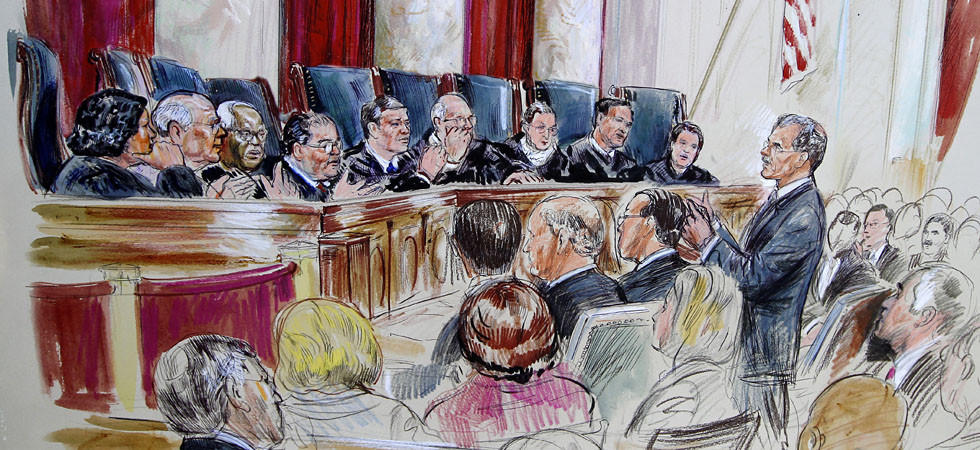Q&A
The Supreme Court tackles gay marriage
Times political correspondent David Lauter breaks down what this week’s Supreme Court arguments mean for gay marriage is the U.S.
Timeline: Gay marriage across the U.S. | Photos: Scenes and key players | Cheat sheet: DOMA vs. Prop. 8 | Full coverage

The Supreme Court heard arguments in two cases involving same-sex marriage this week. What’s the difference between the cases and how did they get to the court?

At issue in Tuesday’s case was whether the state of California can ban same-sex marriage. In 2008, the state’s voters approved a ballot initiative, Proposition 8, which limited marriage to opposite-sex couples. Gay couples challenged the law, and after hearing extensive testimony about the issue, a federal district judge struck down the law, saying that it violated gay couples’ constitutional rights to prevent them from marrying. The state of California decided not to appeal the ruling, but the group that had sponsored the ballot measure did. A federal appeals court then sided with the district judge, ruling that Proposition 8 violated the federal constitution. The sponsors of the ballot measure asked the Supreme Court to hear the case.
Wednesday’s argument concerned gay couples in states that allow same-sex marriage and posed the question of whether the federal government can deny them benefits that other legally married couples receive. Passed in 1996, the federal Defense of Marriage Act denies those benefits. A district court and an appeals court ruled the law unconstitutional in a case brought by Edith Windsor, an 83-year-old woman who lives in New York, which recognizes same-sex marriages. When Windsor’s wife died, the IRS said she owed $360,000 in taxes on property she had inherited. Married couples are exempt from that tax. Windsor sued and won in district court and the appeals court. The Obama administration decided in 2011 that DOMA violates the constitutional rights of gay couples but has continued to enforce the law pending a decision by the nation’s highest court.

The court’s term ends in late June. Rulings in the two cases could come any time before then.

The justices could uphold DOMA, which would keep the status quo in place, but a majority of the justices indicated in Wednesday’s arguments that they have strong doubts about the law’s constitutionality.
If the justices strike down the law, same-sex couples who live in states that allow them to marry would be entitled to all the federal benefits that opposite-sex couples receive, including tax provisions for married couples, social security survivors benefits and protection for spouses under federal immigration laws. Such a ruling would have no impact on couples who live in states that do not allow same-sex marriages.

A lot depends on how broadly the ruling is written. If the ruling holds that the constitution forbids laws that discriminate against gay men and women unless the government can show a “compelling” reason, that could invalidate other laws that treat gays differently.

The California case potentially could lead to a nationwide ruling that would allow same-sex marriages in all states, overturning laws in 41 states that currently ban them. But during the arguments, a majority of the justices seemed to be looking for a way to avoid going that far right now. At the same time, the majority also did not seem willing to uphold Prop. 8. Several key justices indicated that they thought the law unfairly discriminated against gay couples and their families.
The court has several ways to dispose of the case without a broad ruling on the substantive issues, if that’s what the majority wishes to do. One possibility would be to throw out the case on the grounds that the private group which brought the appeal does not have the legal status, known as standing, to bring the case in federal court. Another possibility would be simply to dismiss the appeal without a ruling. A third option would be to send the case back to the appeals courts for more work.

If the court disposes of the California case without ruling on the substance, would same-sex marriages go ahead in the state?

Probably. If the court simply dismisses the case, the appeals court ruling against Prop. 8 would stand. If they rule that the private parties lacked standing to pursue the case, the state of California likely would take the position that Prop. 8 has been ruled unconstitutional by the federal courts and that same-sex marriages are once again valid. If the court sends the case back to the appeals court for further proceedings, that could also lead to a new decision by the appeals court which would once again strike down the ban.
| Advertisement |
|
|
This page was created by the Data Desk, a team of reporters and Web developers in downtown L.A.
- Track our latest projects »
- Fork our open-source code on Github »
- Send us e-mail at datadesk@latimes.com »






